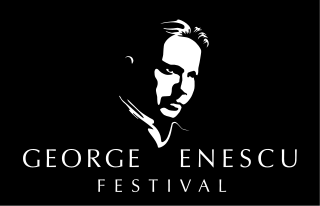Related Research Articles

Constantin "Dinu" Lipatti was a Romanian classical pianist and composer whose career was cut short by his death from effects related to Hodgkin's disease at age 33. He was elected posthumously to the Romanian Academy. He composed few works, all of which demonstrated a strong influence from Hungarian composer Béla Bartok.

The National University of Music Bucharest is a university-level school of music located in Bucharest, Romania. Established as a school of music in 1863 and reorganized as an academy in 1931, it has functioned as a public university since 2001. It also offered training in drama until 1950, when this function was taken over by two institutes which were later reunited as the Caragiale National University of Theatre and Film (UNATC).
Octavian Nemescu was a Romanian composer of orchestral, chamber, choral, electroacoustic, multimedia, metamusic, imaginary and ritual works.
The State Philharmonic Orchestra of Sibiu is an orchestra from Romania.

The George Enescu Festival, held in honor of the celebrated Romanian composer George Enescu, is the biggest classical music festival and classical international competition held in Romania and one of the biggest in Eastern Europe. The festival proposal was authored by Andrei Tudor in 1955. Enescu's close associate George Georgescu organized the first festival in 1958; highlights included a performance of Bach's Concerto for Two Violins with Yehudi Menuhin and David Oistrakh as soloists and a staging of Enescu's sole opera, Œdipe, with Constantin Silvestri conducting.
Zygmunt Krauze is a Polish composer of contemporary classical music, educator, and pianist.

Ştefan Gheorghiu was a Romanian musician, violinist and teacher, born in Galați, Romania.

Eduard Kunz, is a Russian pianist. He reached the 2nd round in the International Tchaikovsky Competition in 2011.

George Georgescu was a Romanian conductor. The moving force behind the Bucharest Philharmonic Orchestra for decades beginning shortly after World War I, a protégé of Artur Nikisch and a close associate of George Enescu, he received honors from the French and communist Romanian governments and lived to make recordings in the stereo era.
Valentin Gheorghiu was a Romanian classical pianist and composer. He is regarded as a leading Romanian pianist of the twentieth century, focused on both piano concertos of the Romantic period and chamber music. He won the prize for the best performance of Enescu's Violin Sonata No. 3 at the first George Enescu International Competition in 1958, with his brother Ștefan as the violinist. He made recordings with international orchestras and conductors.

EUROPAfest is an international music festival held every May in Bucharest, Romania. The festival is the only one in Europe which presents four music genres in a single event: jazz, blues, pop, and classical music, bringing together bands and classical musicians from 45 countries. The festival includes competitions, workshops, master classes, jam sessions, and concerts.
Maia Ciobanu is a Romanian composer and music educator. She is also the author of books, studies and papers on music.
Adriana Hölszky is a Romanian-born German music educator, composer and pianist who has been living in Germany since 1976.

Carmen Petra Basacopol was a Romanian composer, pianist, musicologist and academic teacher. She taught at the National University of Music Bucharest, between 1962 and 2003, and at the Rabat Conservatoire in Morocco in the 1970s. As a musicologist, she achieved a PhD from the Sorbonne University in Paris in 1976, with a dissertation about three Romanian composers who had influenced her, George Enescu, Mihail Jora and Paul Constantinescu, composers representing essential features of Romanian music.

Alexandru Hrisanide was a Romanian pianist and composer who was a representative of late 20th century Romanian avant-garde. A Netherlands resident since 1974, he taught piano and composition at the Amsterdam and Tilburg Academies of Music. Hrisanide's music achieves an original synthesis between archaic melos and modes on the one hand, and the accomplishments of the modern Viennese school on the other. He won the Lili Boulanger Foundation Prize in 1965.
The Ploiești Philharmonic Orchestra is a Romanian orchestra based in Ploiești, Prahova County. The orchestra's home is the Paul Constantinescu Philharmonic, located in centre of Ploiești.

The Sonata No. 3 in A minor "dans le caractère populaire roumain" for violin and piano, Op. 25, is a chamber music composition written in 1926 by the Romanian composer George Enescu. The score, published in 1933, is dedicated to the memory of the violinist Franz Kneisel. It is one of the composer's most popular and at the same time most critically respected works.
Ioana Cristina Goicea is a Romanian-born violinist and Violin Professor at the University of Music and Performing Arts Vienna.

Luiza Borac is a Romanian classical pianist.
Vara Magica Festival ["Magic Summer" Festival] is a classical music festival held in Romania since 2012. It takes place in Bucharest, at the Romanian Athenaeum, during July-August, between the regular Romanian Philarmonic Orchestra season and George Enescu Festival. The festival features both young artists from various National Youth Orchestras, as well as well-known Romanian and international classical music soloists, such as Alexandru Tomescu, Alexander Sitkovetsky or Elena Moșuc, and experienced orchestras, such as the George Enescu Philharmonic Orchestra. The typical schedule of Vara Magica Festival includes, on average, 8-12 concerts scattered all over the summer holiday.
References
- ↑ "Youth Guide – European Music Council (EMC), Conseil Européen de la Musique (CEM), Europäischer Musikrat (EMR), Consejo europeo de la música (CEM)". Archived from the original on 2015-04-17. Retrieved 2015-04-17.